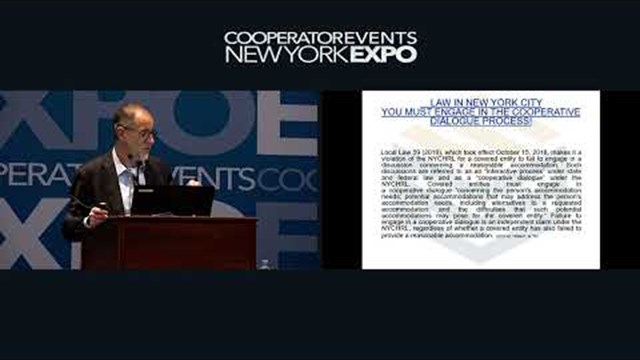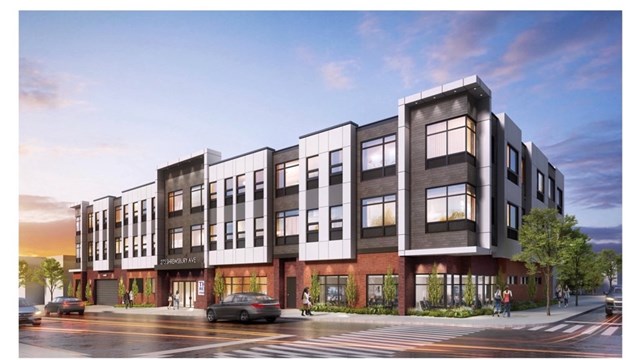Getting around in New York City can be difficult, even at the best of times; traffic, crowds, construction, and inclement weather can all conspire against even the most able-bodied city-dweller. The situation can be more troublesome still for elderly New Yorkers, and those of us living and working with disabilities. For someone using a wheelchair, every curb poses a challenge; for those navigating without the benefit of sight, the sidewalk can be an obstacle course. For anyone recuperating after surgery or serious injury, getting into and out of their own home can pose problems"¦particularly if their building isn't in step with two very important pieces of legislation: the Fair Housing Amendments Act (FHAA) and the Americans with Disabilities Act (ADA).
The FHAA was last amended in 1988, and prohibits housing discrimination on the basis of disability (as well as race, color, religion, sex, and familial status). Both the ADA and the FHAA cover private housing as well as Federal, State, and locally funded housing, and affect both rental and purchase processes, new construction, zoning, and advertising. Of the most concern to co-ops and condos, however, is the issue of providing equal access to and use of buildings, common spaces, and private units to disabled residents.
The FHAA requires owners and operators of housing facilities - including co-ops and condos - to "make reasonable exceptions in their policies and operations to afford people with disabilities equal housing opportunities." This might be something as simple as a board with a "no pets" rule allowing a blind resident to keep his or her seeing-eye dog on the property, or relaxing a mandatory carpeting rule that would cause difficulty for someone using a wheelchair.
When nothing has to be torn down, changed, or built from scratch, ADA/FHAA compliance might seem like a no-brainer for boards, but that's not always the case. In the case of Gittleman v.Woodhaven Condominium Association, a disabled condo owner petitioned his board for a designated space in the building's parking facility. The condo association denied the resident's request on the grounds that the building's master deed said that parking spaces were "common elements" that could be used by all unit owners non-exclusively.
In court, however, it was determined that that under federal housing law, the condo board was "duty bound to: (1) avoid enforcing provisions of the master deed that have discriminatory effects; and (2) regulate the use of the common elements so as to comply with the requirements of the FHAA. The condo was found guilty of discrimination under the FHAA for insisting on upholding a technicality in their deed, rather than making a relatively minor concession to a disabled resident.
"A lot of boards don't seem to realize that a lot of [non-physical] accommodations are accommodations just in terms of house rules," says Glen H. Parker, an attorney with the Manhattan law firm of Hoey King Toker & Epstein. "Like the "˜no pets' clauses. In plain English, these are exceptions for one shareholder - not the total abolition of the rule. It's still in full force and effect for everybody else." Parker says that sometimes this misunderstanding can cause boards to balk at bending the rules to accommodate a disabled resident.
"We don't see disagreement with seeing-eye dogs," Parker continues. "More with companion animals prescribed for people suffering from depression or other mental illnesses. The board may ask for some documentation from the person's doctor saying "˜I need a pet; please allow me to keep this animal,' and the board can investigate the merit of the person's request. Exceptions only happen when it's an undue burden [on the building or its other occupants]." In other words, a cat or small dog would be hard to object to, whereas a llama or large pig might be harder to justify.
But that's the easy stuff. According to the FHAA, it is unlawful "to discriminate against any person in the terms, conditions, or privileges of sale or rental of a dwelling, or in the provision of services or facilities in connection with such dwelling, because of a handicap..." That means it's illegal to refuse "to make reasonable accommodations in rules, policies, practices, or services, when such may be necessary to afford a handicapped person equal opportunity to use and enjoy a dwelling." This part of the FHAA is often interpreted as requiring residential buildings to make access-related modifications to both private residences and common-use spaces for disabled residents, and is usually backed up by State and local laws and ordinances.
"Federal law says you make reasonable accommodations," says Douglas Heller, an attorney with the law firm of Friedman Krauss & Zlotolow in Manhattan. "But what's reasonable? Is the disabled individual knowingly buying into a building with a huge grand staircase in the lobby?"
While a lot of alterations are the financial responsibility of the association or corporation, others are required by law to be made by the resident requesting them. And while in communities outside New York City the Federal and State laws are pretty much the last word, in New York City proper, there's also the local New York City Human Rights Code to consider - and therein lie more sources of conflict.
According to Gerry O'Brien, an attorney with the Chicago-based law firm of Kovitz Shifrin Nesbit, "Payment for alterations is kind of a gray area - parties are encouraged to settle their requests in-house, instead of litigating, of course. There's language in the law in which the association or board should pay the cost of "˜reasonable' accommodation, but then that brings us back to the question of what's "˜reasonable'." And if that question can't be settled between shareholders and boards with the help of mediators and informal meetings, it's off to court.
So does a board need to worry about installing an entrance ramp for the shareholder who broke his leg skiing in Aspen and will be hopping around on crutches for a couple of months? Maybe.
According to Robert Meisner Esq., principal and founder of Meisner & Associates PC - a Michigan law firm specializing in condominium law - "There are many impairments that can qualify as a disability, even short-term physical and/or mental impairments. A person is disabled under the ADA if he or she has a physical or mental impairment that substantially limits one or more of his or her major life activities, he or she has a record of such an impairment, or he or she is regarded as having such an impairment." Meisner also points out that, "The ADA prohibits discrimination against persons who are associated with an individual with a disability - like a parent, spouse, or caregiver," and points out that "An association should be cautious if it is considering denial of a request because it does not think the individual is impaired enough to warrant [the accommodation]. Under the ADA, an association is not allowed to inquire into the specifics of a person's disability. Requiring a general certificate from a doctor to determine eligibility"¦would probably not violate the ADA, but a [board] should not engage in "˜rating' a disability as serious - or not serious enough - to warrant an accommodation."
That said, however, there are certain exceptions to the accommodation rule, even in the case of a legitimately disabled individual. According to the New York office of the Department of Housing and Urban Development (HUD), it is illegal for a landlord or property owner/manager to "refuse to let you make reasonable modifications to your dwelling or common use areas"¦if necessary for the disabled person to use the housing. However, housing need not be made available to a person who is a direct threat to the health or safety of others, or who currently uses illegal drugs."
While few would argue against a board or manager for refusing to accommodate the needs of a dangerous drug addict or criminal, most litigation involving accessibility issues are, according to Parker, "overwhelmingly decided in favor of the disabled." Occasionally, structural and financial limitations make it flat-out impossible for a board or association to make the requested accommodations.
In the case of Dorsey vs. Hawthorne Garden Owners Corp. et. al. for example, a co-op shareholder in Freeport, New York alleged that she was disabled within the meaning of the ADA, and used a wheelchair because she could no longer use her legs. She argued that the steps from the fist floor of her building down to the common area and the steps down to the public sidewalk outside were not wheelchair accessible and that her safety would be at serious risk if there were an emergency in the building, like a fire. The shareholder claimed that she'd been petitioning her board since 1996 to install a ramp at the entrance of the building and a wheelchair lift inside, but that the board had repeatedly refused her request.
The plaintiff's board, however, argued that to install the features that Ms. Dorsey was demanding constituted more than a "reasonable accommodation," and - since it would "pose an undue hardship or substantial burden" to the co-op - it wasn't up to them to incur the expense. The board hired an architect to do a feasibility assessment on the plaintiff's requests, and the architect determined that what Ms. Dorsey was asking for just wasn't feasible, given the design of the front entrance and space constraints. According to the case log, the architect determined that the co-op would have to "take over the apartments of other shareholders and undertake major construction costing a prohibitive amount of money," to accommodate the plaintiff's demands. On top of that, it was shown that the co-op's finances had been in the red for several years leading up to the suit, and they couldn't afford to install a ramp anyway.
In an earlier case similar to the Dorsey situation, a lower court also found in favor of the co-op, citing past cases in which major alterations had been deemed "unreasonable, and thus not required by the FHAA, if it either imposes undue financial or administrative burdens or requires fundamental alterations in nature of program."
The New York Supreme Court, which heard the Dorsey vs. Hawthorne case, found in favor of the co-op, stating in its final decision that "summary judgment is granted in favor of defendants" and "dismissing the plaintiff's complaint as having no merit."
Most access-related litigation goes poorly for co-op and condo defendants - and even if a board wins out in the end, a lawsuit is a very expensive way to figure out who's right and who's not. A far better option is to avoid the courtroom in the first place and work with disabled residents to reach a mutually agreeable solution.
According to Parker, the two most important things a co-op or condo board can do when a request or complaint about accessibility arises is to respond immediately in writing that the issue is being investigated - and then have their attorney review the building's governing documents and advise the board as to the best course of action. Openness and a willingness to work together to fix the problem are essential ingredients for success, says Parker; "Just tell the resident that you're investigating it, that you're working on it," he says. "These people are your neighbors, so there should never be just a knee-jerk reaction to say "˜No'." Oftentimes, a quick, civil response to a resident's complaint goes a long way toward avoiding a lot of expense and animosity - and that's an accommodation that costs nothing to make.










8 Comments
Leave a Comment